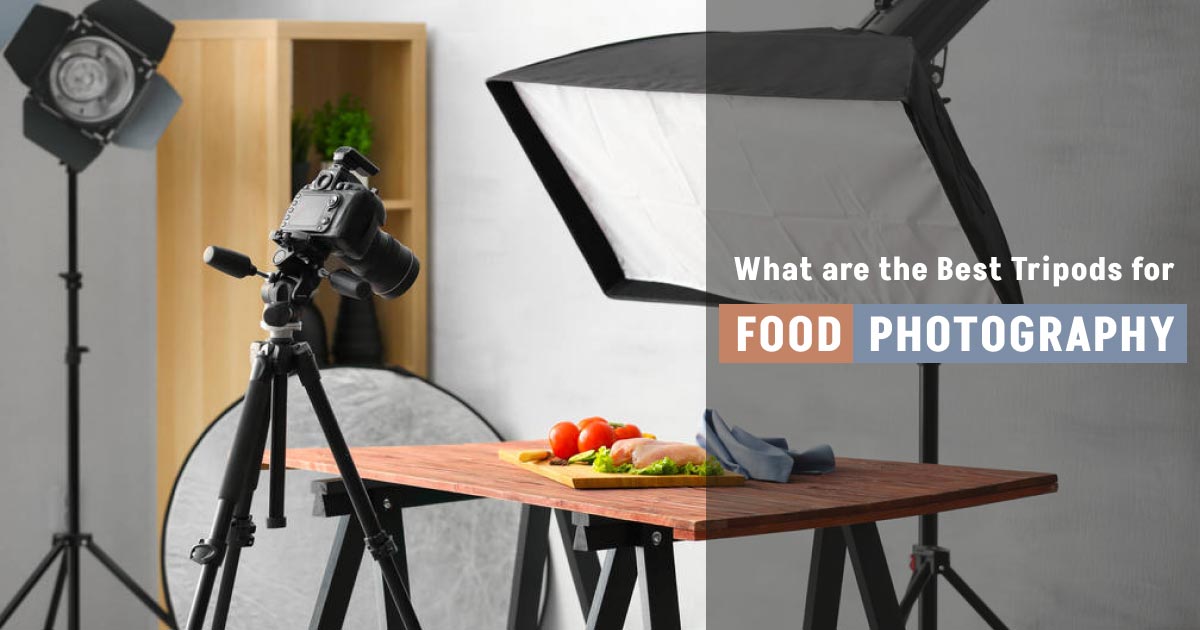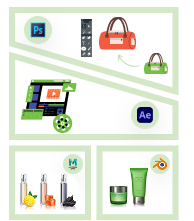Food photography necessitates a variety of shooting angles, from standard horizontal to overhead and macro shots, making the use of a tripod absolutely necessary.
However, not all tripods are strong enough to support you for a long time. Some break after a while of use, while others can’t support the weight of the equipment and topple over, breaking the camera or lens. Therefore, it’s important to make a careful choice that is both high-quality and versatile in its uses.
Let’s explore some of the tripods for food photography that may help you with your upcoming food photoshoots.
What you’ll learn in this article
- 1 What are the Different Types of Tripods for Food Photography
- 2 Why Do You Need a Tripod for Food Photography?
- 3 The Things to Look at When Deciding What the Best Tripod for Food Photography
- 4 The 10 Best Tripods for Food Photography
- 4.1 1. Vanguard Alta Pro 263AP Aluminum Tripod
- 4.2 2. Manfrotto MT190XPRO4 Aluminum 4-Section Tripod
- 4.3 3. Manfrotto 055 Aluminum 3-Section Tripod Kit
- 4.4 4. Manfrotto 058B Studio Camera Tripod
- 4.5 5. Manfrotto 290 Xtra Carbon Fiber 3-Section Tripod (MT290XTC3US)
- 4.6 6. Gitzo GT2542 Mountaineer Tripod Series 2 4 Section
- 4.7 7. K&F Concept TM2515T Aluminum DSLR Camera Tripod
- 4.8 8. JOBY GorillaPod Original Tripod
- 4.9 9. Neewer Camera Tripod Monopod
- 4.10 10. Benro SystemGo Plus Aluminum Tripod
- 5 How Much Does a Tripod Cost in New York, USA?
- 6 FAQ’s
- 7 Final Verdict
What are the Different Types of Tripods for Food Photography
Tripods might seem like a simple photography tool, but they are available in a range of sizes and build quality, making them suitable for use in different locations for various purposes; for instance, inside a studio for commercials; in restaurants for shooting menus; outdoors for commercials or vlogging, and many more.
Anyway, since our concern relates to food photography, let’s look at the different kinds of tripods that can be used to take pictures of food.
Lightweight Tripods
A lightweight tripod may seem like the perfect tripod for you if you are a food vlogger or have to travel extensively for food photography. Sadly, you are mistaken!
A tripod’s main function is to hold your camera securely. But what good is a tripod if it trips over while supporting your camera and breaks the camera or lens?
The most important requirement of a compatible tripod is that it must weigh more than your mounted equipment to support the overall weight and remain stable in its position without the risk of falling over.
Therefore, light tripods are strongly discouraged for use with heavy cameras and lenses. However, if you do food photography on your smartphone, then you can certainly go for it.
Nonetheless, let’s say you want a better-quality, lightweight tripod. In that case, you could buy a larger full-size lightweight tripod instead, as they are more lightweight in comparison to other heavy-duty full-size tripods and offer better support.
Medium-Weight Tripods
Medium-weight tripods are ideal for beginner photographers or those who are thinking about using one for the first time. Since beginners need to learn how a tripod works to get the shots just right or how to control tripods while shooting, they should typically start out with a reasonably priced medium-weight tripod.
The positive side of this type of tripod is that it is neither too heavy nor too light in weight. So, it is quite compatible to hold the camera and lens firmly and easily portable. Besides, the photographer can switch to a better model if they feel uncomfortable using the one they bought.
However, one downside of this tripod is that it doesn’t come with a head. So, you have to purchase the tripod head separately.
Heavy Duty Tripods
Food photography mostly calls for overhead shots. For overhead or top-down photography, the tripod needs to be strong enough to support the weight of the camera and heavy lenses in order to hold the camera above and parallel to the food items.
Therefore, using a heavy-duty tripod is your best bet for taking professional-quality food images. These tripods are expensive and made of sturdy, high-quality materials. On top of that, their larger size allows the legs to spread out widely without obstructing the frame.
These tripods are typically quite heavy, and the tripod head adds even more weight, making them a little challenging to transport for outdoor photography. The support it offers, however, makes it unquestionably the best investment in tripods.
Video Tripods
Video tripods are great for shooting food commercials. This tripod is a large-sized heavy-duty tripod with large heads, making it compatible for use with heavier cameras. The special feature of this tripod lies in its head. The fluid movement of the head makes panning and tilting smooth.
However, the drawback of this tripod is that it only supports horizontal camera mounting. Therefore, it won’t work if you want to use it for a vertical food photo shoot.
Why Do You Need a Tripod for Food Photography?
Although a tripod is often considered an optional accessory, it is one of the essential tools needed for food photography. Using a tripod has several advantages, which are detailed below.
- Sharp images: A tripod keeps the camera steady, preventing the camera shake. As a result, crisp, clear pictures that are visible in their sharpest form can be captured.
- Great long-exposure images: Long-exposure images require a slow shutter speed and a stable camera position to avoid a blurry effect. With the aid of a tripod, the photographer can secure the camera in a fixed position while capturing wonderful long-exposure shots with a low ISO and slow shutter speed.
- Efficient composition and styling: Food products and props must be moved around frequently in the composition to create the styling. It gets tiresome to lift and lower the camera each time to arrange a composition while maintaining a constant angle. A tripod maintains the camera’s angle so that photographers can see how the composition appears from their desired perspective.
- Perfect overhead shots: Tripods have a central column that can be extended both vertically and horizontally to mount the camera at a 90-degree angle above the food items to capture excellent overhead shots.
- Prevents lower back pain: Handheld camera operation requires photographers to bend over food items to capture top-down images, which can cause severe back pain and other backbone-related health issues. So, mounting the camera on a tripod can reduce the bending posture and reduce the tendency to cause back pain.
The Things to Look at When Deciding What the Best Tripod for Food Photography
Tripods are available in a variety of styles, sizes, quality, and price ranges. When buying one, it’s important to buy a better one so that it won’t need to be replaced or result in a waste of money.
So let’s look at some of the crucial characteristics to take into account when buying a tripod.
1. Budget & Brands
The first thing to consider when buying a tripod is your budget and brand preference. Renowned and trusted brands use premium-quality materials to produce their products. Therefore, whichever tripod you choose to buy, you can be sure that its quality will not be compromised.
Besides, the quality of a tripod varies according to its price range. A low-cost tripod will be less durable than an expensive one. So, purchasing a cheap tripod that won’t last long would not be a wise decision. Try to invest in a good one even if you are on a tight budget.
2. Height, Weight & Stability
When purchasing a tripod, make sure it can be extended at least to your eye level so that you can see the viewfinder of your camera. Also, consider the height of the table where you will take the pictures, as some space between the camera and the food item is necessary when the camera is mounted in the flat-lay shooting position.
Besides, the weight of your tripod should be way more than the combined weight of your camera and the lens. In addition to supporting the camera, the heavyweight will keep the tripod from toppling over if you ever accidentally bump into it.
Besides the weight, the design of the feet provides stability to the tripod. Rubber feet give additional stability and control the tripod from slipping, preventing your equipment from ever being smashed to the ground. Additionally, some tripods have hooks on the center column where you can hang a counterweight to give the tripod more stability.
3. Overhead & 45-Degree Orientation
The most commonly used angles for food photography are 45-degree angles and 90-degree angles. So, the central column of the tripod must have an adjustable orientation. Make sure the tripod head is capable of 360-degree tilting and panning, and the central column should be able to be extended both horizontally and vertically.
4. Legs (Sections, Adjustable & Locking Mechanism)
Every tripod has three adjustable legs. Depending on the height of the tripod, the legs typically have 3 to 5 sections. These sections are locked together using a special locking mechanism. The legs made of aluminum and other metals have a flip lock system, while the legs made of carbon fiber have a threaded twisted lock system.
Also remember that the more sections you have on your tripod, the more height it will gain, but with more height, the chance of your tripod losing its stability increases.
The 10 Best Tripods for Food Photography
The following is some options to consider if you’re looking for tripods for food photography.
1. Vanguard Alta Pro 263AP Aluminum Tripod
The Vanguard Alta Pro 263AP is one of the popular tripods for overhead food photography. It has a multi-angle central column system that can rotate from 0° to 180° in both horizontal and vertical directions.
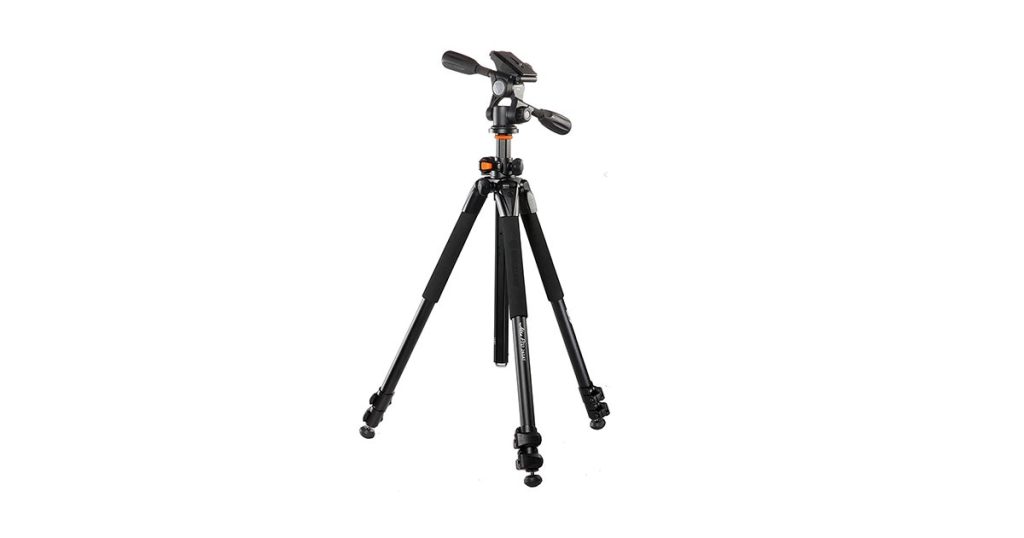
You can ensure accurate framing with the three-way head’s smooth tilting and panning ability. Also, its compact size and light weight make it travel-friendly.
Key Specifications
- Compatible device: Camera
- Material: Aluminum, Rubber
- Head type: Pan’s heads
- Adjustable height range: 42cm – 151.5cm
- Weight: 2.6kg
- Weight capacity: 5g
- Color: Black, Silver
| Pros | Cons |
| The multi-angle central column system can be adjusted from 0° to 180° and rotates 360° | Using screws in a wet environment can cause them to rust |
| Legs can be positioned at three angles: 25, 50, and 80 degrees | Be extra cautious because the plastic component locking the central column is quite flimsy |
| A high-quality magnesium die-cast canopy with a bubble level for precise positioning | |
| Vibration and shock controllers have been included | |
| A detachable hook is provided To hold extra weight and camera equipment, | |
| Spikes and rubber feet for stability | |
| A two-handled 3-way fluid pan head |
2. Manfrotto MT190XPRO4 Aluminum 4-Section Tripod
The Manfrotto MT190XPRO4 is one of the best tripods for food photography. The four-leg sections make the tripod more portable, making it perfect for food photographers who must travel extensively. This tripod’s most practical feature is the ability to move the central 90-degree column with one finger.
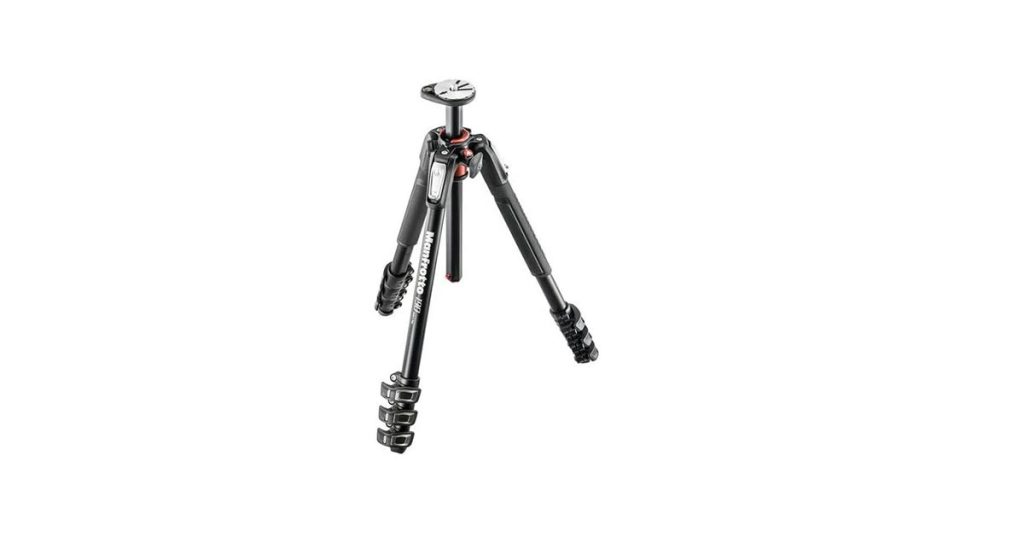
Aside from that, the quick power lock is robust, fluid, and quick enough to be extended with just one hand. The easy-link plug feature also enables the connection of additional lights to improve lighting for the photo shoot.
Key Specifications
- Material: Aluminum
- Head type: Video heads, Fluid heads
- Number of leg sections: 4
- Adjustable height range: 8cm – 160cm
- Weight: 4.6 pounds
- Color: Black
| Pros | Cons |
| The Quick Power Lock system allows for quick setup. | Heads must be purchased separately |
| Rotating bubble level ensures a balanced position | Just two of the legs have rubber grips |
| Q90 column provides excellent positioning | Additional care must be taken when extending and collapsing the plastic joints |
| Rubber grips on the legs add more stability | |
| A link plug is available for connecting accessories |
3. Manfrotto 055 Aluminum 3-Section Tripod Kit
Manfrotto is a prestigious brand that every photographer adores for its top-notch quality tripods. Therefore, the sturdy Manfrotto 055 Aluminum 3-Section Tripod has become one of the most popular and best tripods for overhead food photography among beginner photographers.
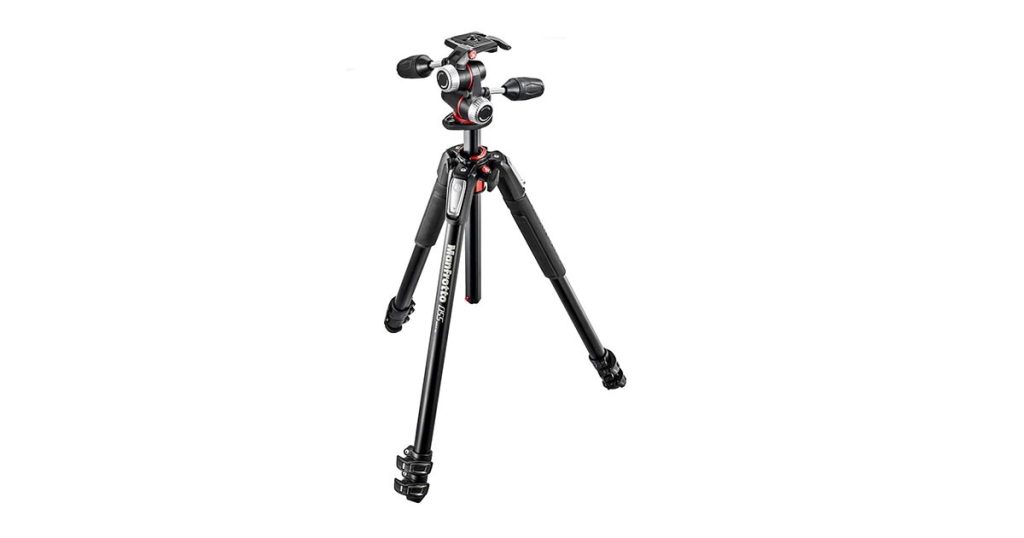
This model has some features that allow one-finger and one-hand operation. Even with a camera attached, the tripod’s 90-degree center column can be extended horizontally and vertically with just one finger, and the easy locking mechanism only needs one hand to extend the legs. Moreover, users can adjust the bubble level in the center column however they see fit.
Key Specifications
- Compatible device: Camera
- Material: Aluminum
- Number of leg sections: 3
- Adjustable height range: 9cm – 170cm
- Weight: 5.5 pounds
- Weight Capacity: 9kg
- Color: Black
| Pros | Cons |
| Strong locking of each section is ensured by Quick Power Levers (QPL) | If the knobs are overtightened, they could break. |
| QPL increases its rigidity and stability | Heads must be purchased separately |
| The length of the horizontal column can be changed | There is no counterbalance hook |
| The bubble level can freely rotate for accurate framing | Warranty registration cannot be made without the original packaging. |
| Legs can be positioned at various angles | |
| For attaching accessories, a link connector is available |
4. Manfrotto 058B Studio Camera Tripod
The Manfrotto 058B may come out on top as the best professional food photography tripod. Although it’s heavy and difficult to move around with, this tripod is ideal for use in a studio. Additionally, it is insanely durable and has an extremely long lifespan.
This innovative studio tripod has many noteworthy features, such as an intelligent automatic leg release system that lets you release all three legs simultaneously or just one leg to adjust your position. Besides, a built-in spirit level allows you to quickly and easily adjust the tripod to your desired angle.
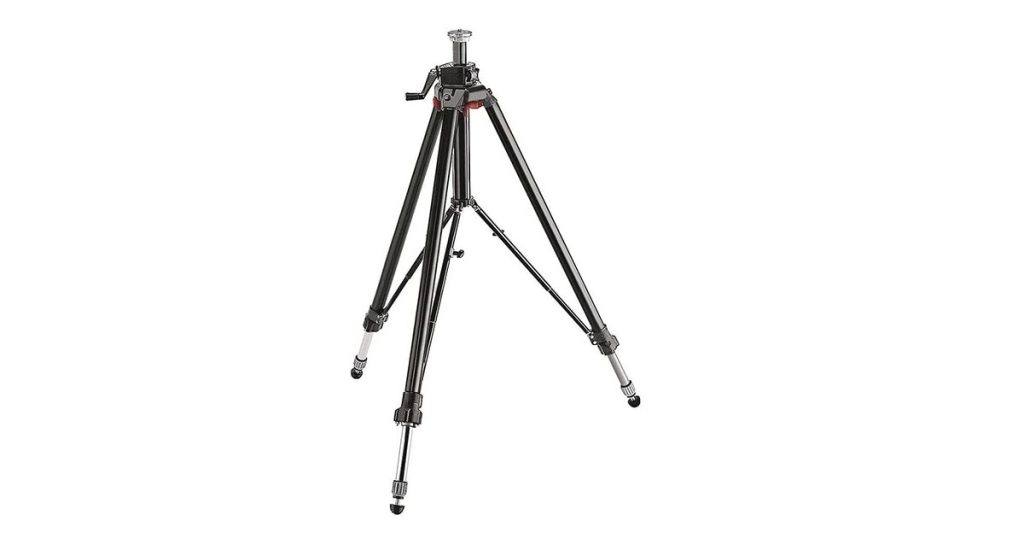
Additionally, the built-in telescopic struts are simply activated by a quick-release plate, allowing you to quickly take pictures from a wide range of perspectives with little effort. Additionally, the excellent extendable height eliminates the need to stoop when shooting on a table.
Key Specifications
- Compatible device: Camera
- Material: Metal
- Number of leg sections: 3
- Adjustable height range: 44cm – 217cm
- Weight: 6.7 Kg or 14.74 pounds
- Weight Capacity: 12kg
- Color: Black
| Pros | Cons |
| Its all-metal construction gives it durability | Quite expensive |
| Legs can be set at different angles independently | Not portable friendly due to heavyweight |
| Flexible leg angles provide versatile positioning | |
| An integrated mid-level spreader provides anti-torsional rigidity and prevents the tripod legs from accidentally becoming further apart | |
| Rubber retractable spiked feet it steady both indoors and outdoors | |
| Warranty: 2 years + 8-year extension |
5. Manfrotto 290 Xtra Carbon Fiber 3-Section Tripod (MT290XTC3US)
If you’re looking for a reliable, user-friendly, and highly practical tripod, the premium Italian-designed 290 Xtra Carbon Fiber Tripod is what you need. Its lightweight and foldable design makes carrying it around incredibly convenient.
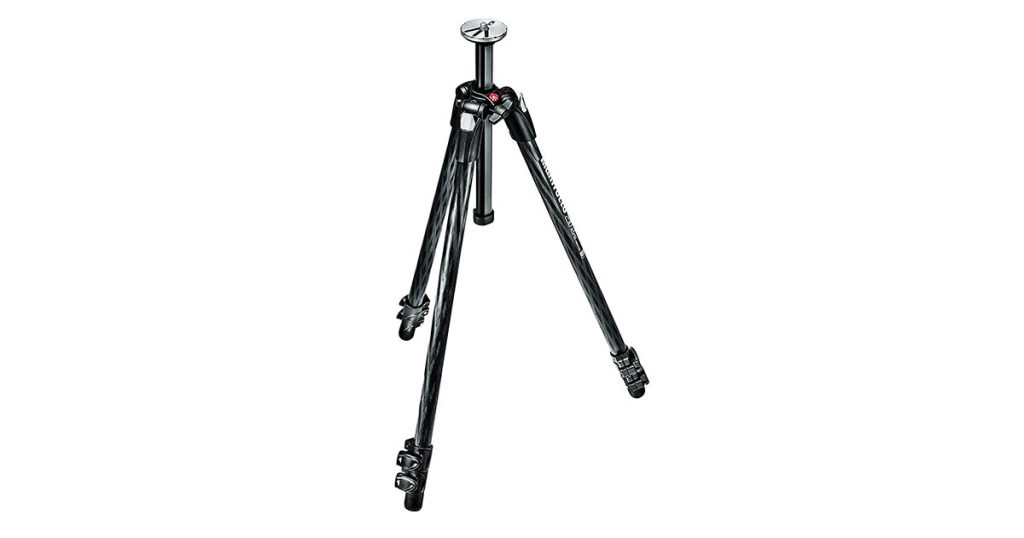
Since the tripod’s legs are made of lightweight carbon composite, you won’t need to be concerned about them buckling or vibrating as you attempt to capture the perfect shot. In addition, the leg locks are made of magnesium, giving the tripods a longer lifespan.
Key Specifications
- Compatible device: Camera
- Material: Carbon Fiber
- Number of leg sections: 3
- Leg lock type: Flip
- Adjustable height range: 30.5cm – 165.5cm
- Weight: 3.4 Pounds or 1.54kg
- Weight Capacity: 11 pounds
- Color: Black
| Pros | Cons |
| 4 leg angles for excellent versatility | No spiked feet |
| Has long-lasting Aluminum leglocks | Heads must be purchased separately |
| Warranty: 6 months + 9 ½ year extension | Frequent retightening is required to keep the head fixed |
6. Gitzo GT2542 Mountaineer Tripod Series 2 4 Section
Gitzo is another popular and trusted tripod company for professional photographers. The lightweight, 4-section Gitzo GT2542 tripod can be considered the best food photography tripod. This tripod is more rigid and durable than others in its category thanks to the use of carbon eXact tubing with stiffer and larger leg diameters and lower leg sections made of high-modulus carbon fiber.
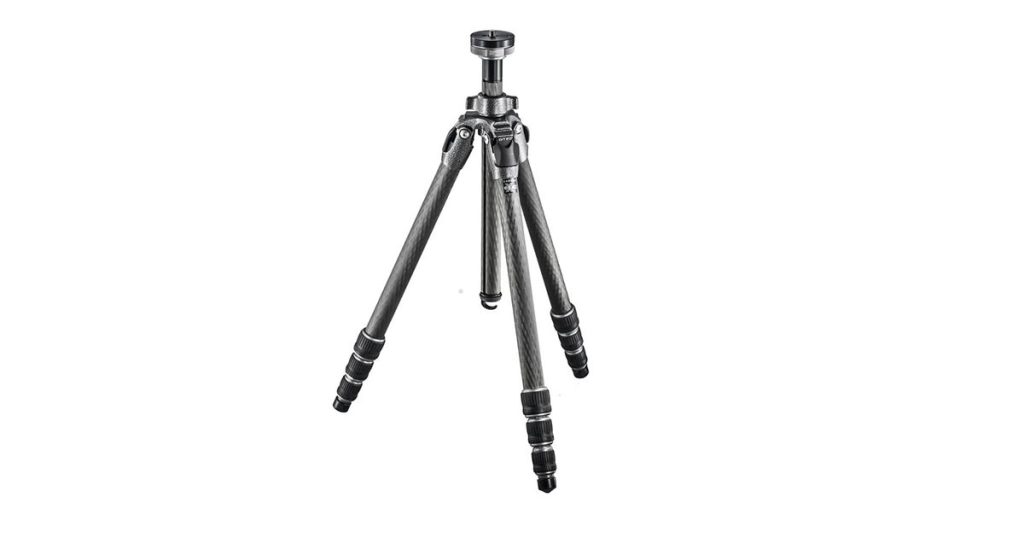
Additionally, the G-lock Ultra twist locks used to secure the four-section legs have a built-in O-ring to keep debris out of the leg mechanism. Also, the large leg angle selectors offer a wider grip area, and the tripod’s top spider has been redesigned for added rigidity. Moreover, with its detachable feet, it can adjust to any surface.
Key Specifications
- Compatible device: Camera
- Material: Carbon Fiber
- Number of leg sections: 4
- Leg diameter: 29mm
- Head type: Ball head
- Lock style: Twist
- Adjustable height range: 15cm – 165.5cm
- Weight: 3.7 Pounds or 1.68kg
- Weight Capacity: 39 pounds or 18kg
- Color: Black
| Pros | Cons |
| G-lock system and Leg Angle Selectors facilitate quicker use | A bit expensive |
| Ground Level Set Mechanism makes use easier | No level indicator |
| Has a reversible central column | Need to purchase the head separately |
| Has a standard height | Carrying bag not included |
| Has removable feet | |
| Has a built-in hook for extra support | |
| 6 months warranty |
7. K&F Concept TM2515T Aluminum DSLR Camera Tripod
K&F Concept TM2515T Aluminum DSLR Camera Tripod is a great option if you prefer to photograph food on a table and need a tripod with a lot of height. Despite being lightweight, it is quite strong and has a huge payload. Besides, the 5 leg sections make its size compact enough to move around without difficulty.
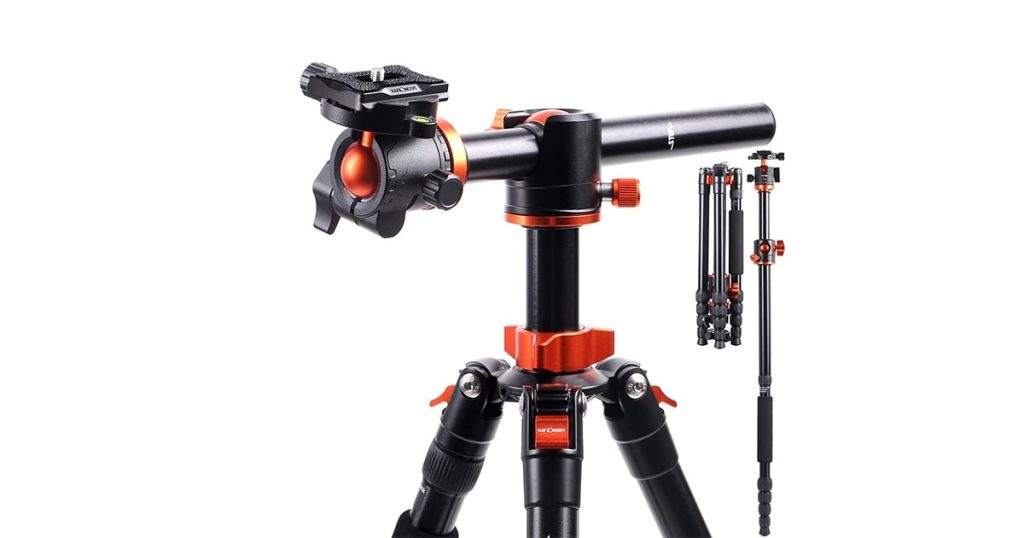
Additionally, the fact that the central column can be adjusted from 0 to 180 degrees and that the ball head can rotate 360 degrees horizontally makes it the best tripod for flat-lay photography.
Key Specifications
- Compatible device: Camera
- Material: Aluminum
- Number of leg sections: 5
- Head type: Ball head
- Lock style: Metal spiral lock
- Adjustable height range: 22 inches-67 inches
- Weight: 1.65 kg or 3.63 pounds
- Weight Capacity: 10 kg
- Color: Black and Orange
| Pros | Cons |
| Central column can move from 0 to 180 degrees and rotate 360°horizontally | Adjusting requires some effort |
| 25mm large diameter aluminum alloy tube provides strong stability | Better not to use it in a wet environment |
| 5 sections leg can extend the height up to 67 inches | Missing spike footing |
| Metal ball head can be rotated 360 degrees | |
| Bubble level helps to identify the ground level | |
| Can be turned into a monopod |
8. JOBY GorillaPod Original Tripod
The JOBY GorillaPod is an exceptional, flexible, and versatile tripod ideal for food bloggers traveling outside for photoshoots. This unusual tripod has more than twenty leg joints that can make the tripod rotate 360 degrees. Additionally, the rubber foot grips give the tripod’s flexible legs more stability. Moreover, the lock ring guarantees a secure connection for your camera.
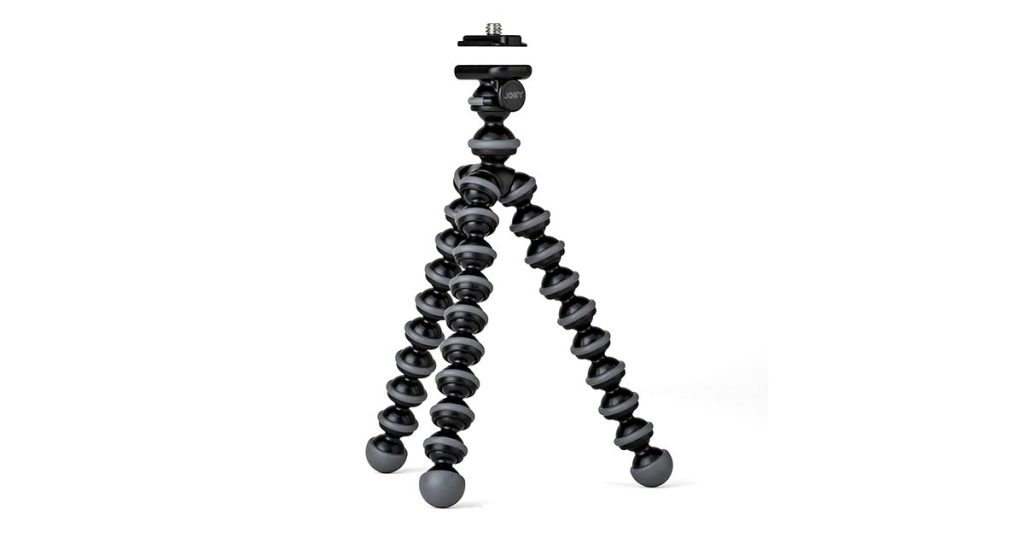
Key Specifications
- Compatible device: Camera
- Material: Carbon Fiber
- Head type: Geared Heads
- Adjustable height range: 6.5cm – 15cm
- Weight: 0.1 Pounds
- Weight Capacity: 0.72 pounds
- Color: Black/Charcoal
| Pros | Cons |
| The flexible legs can turn 360 degrees | Not extendable |
| Quick release clips enable quick switching between shots for improved photography and simpler shooting | Does not support heavy equipment |
| It can hold up to seven times its weight | Not suitable for top-down shots |
| Flexible legs allow you to store and carry it with you anywhere easily | Phones can’t be mounted without an additional attachment |
9. Neewer Camera Tripod Monopod
The Neewer Camera Tripod Monopod is a good option if you’re looking for a tripod that can also be used as a monopod. This sturdy, multipurpose transverse tripod can rotate its central column 360 degrees, making it suitable for any style of photography, including flat-lay photography.
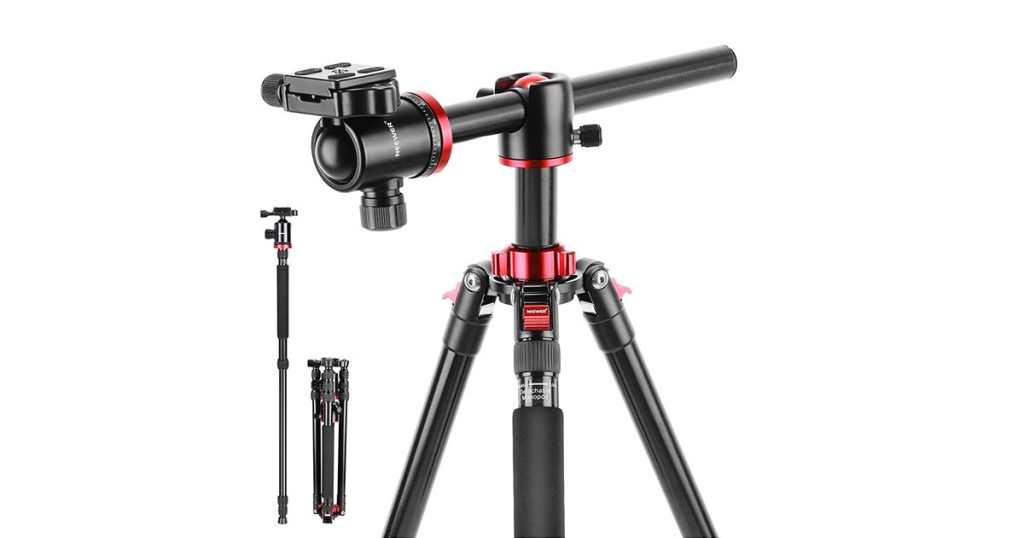
Key Specifications
- Compatible device: Camera
- Material: Aluminum
- Head type: Ball head
- Number of leg sections: 4
- Adjustable height range: 62cm – 75inches
- Weight: 5.2 Pounds
- Weight Capacity: 26.5 pounds
- Color: Red & Black mixed
| Pros | Cons |
| The Center column can be rotated 360 Degrees horizontally | Attaching and removing the monopod takes some effort |
| The non-slip feet design holds the tripod steady | Extra caution is required when tightening the knobs |
| Can be used both as a tripod and monopod | |
| Height can be adjusted with four leg sections and 2 sections center column | |
| A 3-position leg angle adjustment system provides flexible shooting |
10. Benro SystemGo Plus Aluminum Tripod
One of the best food photography tripods on the market is the Benro SystemGo Plus Aluminum Tripod. You’re sure to love this tripod once you learn about its exclusive features. The center column can be rotated 180 degrees both vertically and horizontally making it perfect for any type of shot, including traditional, macro, overhead, etc.
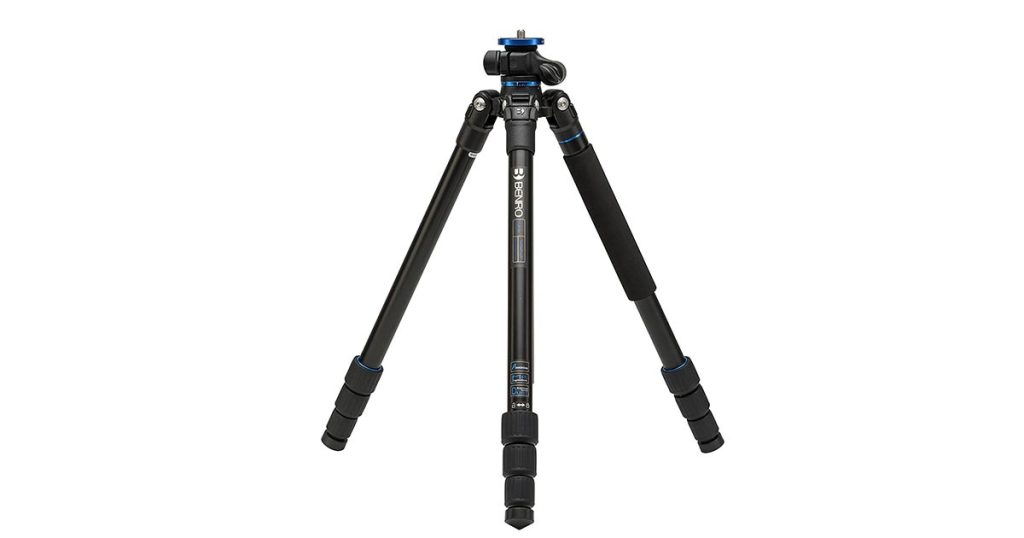
The best feature of this tripod is the simultaneous use of both ends of the center column to mount a second camera, convert it into a workstation, or add more weight to the hook. Additionally, the center column has two flat sides to avoid unintended column rotation. The interchangeable rubber and stainless steel spikes also help the tripod remain stable on any surface.
Key Specifications
- Compatible device: Camera
- Material: Aluminum, Magnesium
- Lock style: Twist
- Number of leg sections: 4
- Adjustable height range: 14.6 inches (37 cm) – 60.6 inches (154 cm)
- Weight: 3.51 Pounds or 1.59kg
- Weight Capacity: 22 lb or 10 kg
- Color: Black
| Pros | Cons |
| 2 cameras can be mounted simultaneously | Need to purchase the head separately |
| The flexible 180-degree center column offers countless camera positioning options, including vertical, horizontal, and inverted positions | Be gentle with the locks |
| Quick leg lock system enhanced stability with quicker deployment | |
| Legs can be locked independently at different angles | |
| Interchangeable rubber and stainless steel spike footings | |
| Additional weight lifting hook at the center column for more stability | |
| Can be used as a monopod | |
| A thick phone grip for comfortable handling | |
| Travel-friendly due to its foldable, compact design | |
| Carrying case included |
How Much Does a Tripod Cost in New York, USA?
Tripods come in a range of prices and quality, from cheap to expensive. Tripod prices typically range from $25 to $150. However, high-quality tripods can cost well over $300, with the average one costing over $60. Besides, some tripods don’t include heads, so purchasing a tripod head separately will increase the cost.
FAQ’s
What tripod do food bloggers use?
Food bloggers often need to travel extensively to different restaurants, which requires a tripod that is convenient to carry as well as provides firm support. That’s why a medium-weight tripod such as the Manfrotto MT190XPRO4 is quite popular among them for its budget-friendly price, convenient features, good performance, and compact design.
How many tripods do you need?
For a beginner photographer, only one tripod is enough. On the other hand, professional photographers might need a minimum of two tripods: one for use as the main tripod and one for travel.
How do I choose a tripod height?
When deciding on a tripod, select the one that matches your height so that you won’t have to bend over to see your frame in the viewfinder. Make sure the mounted camera stays at your eye level. For shooting on a higher table, it would be advantageous if the tripod could be extended further.
What length of tripod should I buy?
A tripod’s standard length is considered 120 cm to 160 cm, or 50 inches to 63 inches, as almost everyone is comfortable with this length. However, you can buy much higher or lower tripods if necessary.
Is a ball head tripod better?
A ball head has some benefits over other types of tripod heads. Ball heads are more flexible and easy to use. Besides, the adjusting knob for repositioning the camera angle rotates smoothly in every direction and supports almost any angle.
Are carbon fiber tripods worth it?
Carbon fiber is regarded as the best material for tripods despite being lighter and appearing to be less durable than aluminum tripods. Surprisingly, it is 2 to 5 times more rigid than other metals like aluminum, steel, etc. It has many benefits, including being lightweight, robust, long-lasting, rust-free, and easily portable.
What tripod do professionals use?
Professional photographers who mostly shoot for commercials and different brands usually prefer heavy-duty tripods because of their incredible stability and high performance. Manfrotto is a well-known brand among photographers because of its superior quality.
Final Verdict
A sturdy tripod is a must-have accessory for conducting mouthwatering food photography. However, when making a purchase, factors like brand, quality, the weight ratio of the tripod and photography equipment, price, and features are important to take into account.
Hopefully, the recommendations in this article for some of the best tripods currently available have helped you decide which tripod is best for taking pictures of food. Whichever tripod you choose, be sure to pick one that is durable and will last for a long time.
